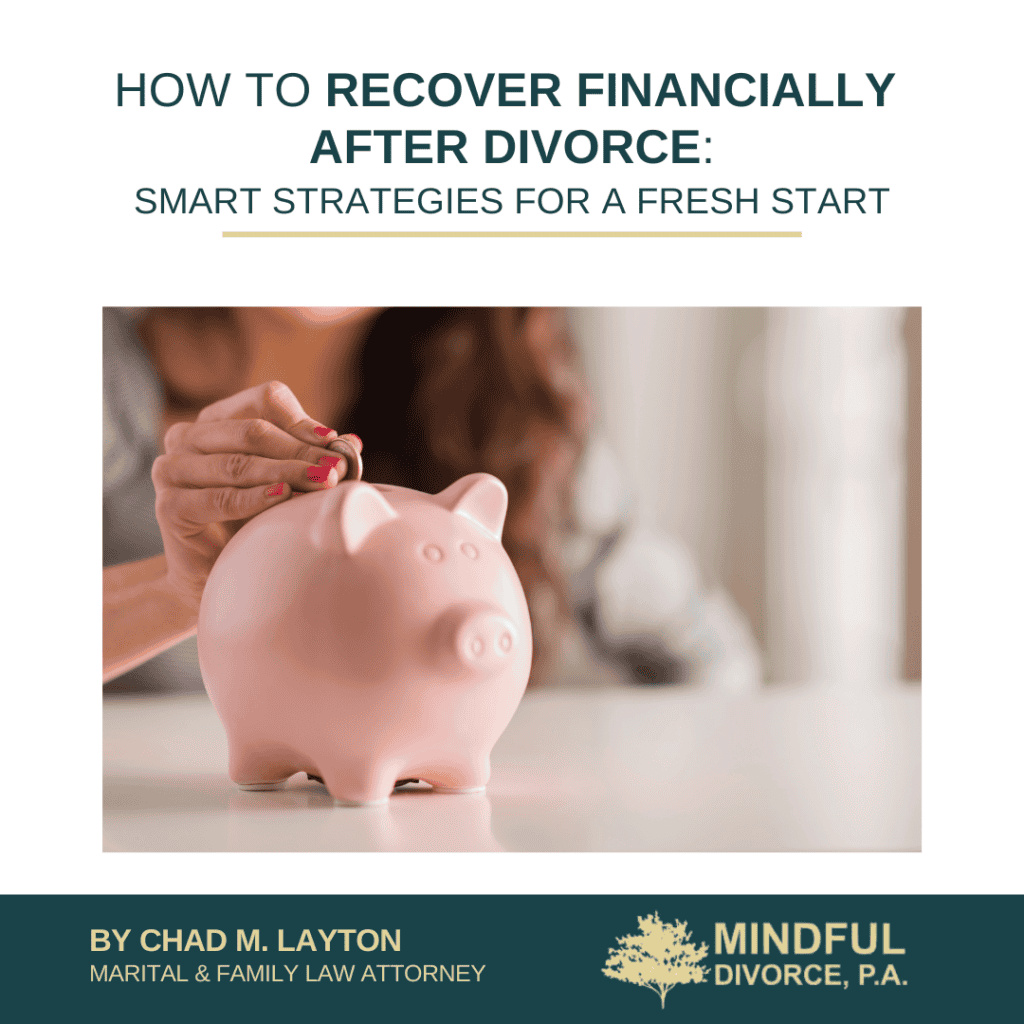
Have you felt overwhelmed by changes in your income and expenses after a divorce? At Mindful Divorce, P.A., we understand how tough it can be to establish a new household and ensure you stay on track financially.
Let’s explore practical ways to stabilize your budget, address your debts, and move toward a steady, more confident future.
Evaluating Your Current Financial Situation
A thorough review of your finances is an essential first step. Consider making a detailed list of everything you own, such as cash in checking or savings, investments, vehicles, and any retirement accounts. Next, gather information on all your debts, including mortgages, credit cards, and unpaid bills.
This overview reveals where you stand financially so you can know if your income covers basic needs. You might break down your assessment as follows:
- Assets: Bank balances, property, retirement funds
- Debts: Mortgages, personal loans, credit card balances
- Monthly Income: Paychecks, alimony, or other sources
- Regular Expenses: Housing, food, transportation
Creating a Post-Divorce Budget
A well-structured budget helps you control your spending and prevents last-minute money surprises. Start by outlining what you earn each month and subtracting the total of your expenses. Focus on essentials before considering extras, so you avoid dipping into savings for basic needs.
Some find it helpful to use a budgeting app or spreadsheet to automate calculations. This allows you to see patterns in your spending and pinpoint areas where you might trim costs. A clear plan helps you stay committed to your new financial reality, especially if you’re adjusting to a single-income household.
Building an Emergency Fund
An emergency fund provides a sense of stability by covering unanticipated bills, like vehicle repairs or medical costs. Aim to save at least three or four months’ worth of living expenses in an account you can reach quickly. You could start with a smaller goal, like one month of expenses, and add more as you go.
Even depositing a little every paycheck can make a difference. Some people set up an automatic transfer from their checking to a designated savings account on payday. This “pay yourself first” method builds your safety cushion steadily over time without putting too much pressure on your daily budget.
Managing and Repaying Debts
High-interest debts can eat away at your finances, so addressing them is a priority. Pay attention to any credit cards with large balances or personal loans with double-digit interest rates. You might tackle these debts first by dedicating extra funds to them or by considering debt consolidation options.
Below is a brief comparison table that outlines possible debt repayment approaches. It shows potential methods, key factors, and the biggest concerns to keep in mind.
If you have debt that both you and your former spouse signed for, try to close or refinance it so neither of you is tied to the other financially. Your divorce settlement may indicate who is responsible for each balance, but it’s still wise to be sure no joint obligations are left open.
Rebuilding Your Credit
A divorce can sometimes lead to missed payments or debt carried in two names, which might affect credit scores. Obtaining a copy of your credit report is the first step in spotting errors or outdated entries. Fixing these or disputing inaccuracies can be an immediate boost to your credit profile.
Once you confirm your history is accurate, try using new lines of credit responsibly. You could look into a secured credit card or ask a landlord to report on-time rent to credit agencies. The ultimate goal is to show that you can pay expenses reliably month after month—this consistency is what helps credit scores trend up.
Severing Financial Ties with Your Former Spouse
Closing joint accounts is an important part of protecting your future. Call your bank or credit card companies and request that these accounts be shut down. If there are balances you must still pay, ask if they will freeze activity so you can complete repayment without leaving the account open indefinitely.
Don’t forget to reset passwords on your various financial accounts, including your email. If you and your former spouse once shared an online subscription, update those login details, too. You want to prevent unauthorized charges or unintentional changes in billing arrangements that might affect your finances down the line.
Updating Important Documents and Beneficiaries
Florida law follows the idea of equitable distribution and spousal support. If you have life insurance, a retirement plan, or brokerage accounts left over from your marriage, update those beneficiaries so they match your wishes going forward. You don’t want an ex-spouse to receive funds if that’s no longer your intent.
It’s also good to rework your estate documents so they reflect your single status. Talk with a trusts and estates professional about revising your will and naming someone you trust to handle any healthcare directives or financial powers of attorney. Review your homeowners or auto policies, too, making sure you have adequate coverage based on your new situation.
Adjusting Your Tax Strategy
A change in your marital status could affect how you file your tax return, along with any credits or deductions you take. Look into meeting a tax professional to review your updated tax bracket or potential liability. They can help you determine if you should adjust withholding on your paycheck or if you might pay estimated taxes throughout the year.
For those who rely on alimony or child-related support, tax professionals can advise on potential changes to your overall bill. With the right plan in place, you can avoid a year-end surprise and feel safer about your financial picture.
Reassessing Your Financial Goals
Your life has changed, and so will your financial outlook. Think about where you would like to be in one year or even five years as a single person. This might include starting a business venture, saving for a new house, or funding retirement more aggressively.
Set short-range and long-range objectives that feel reachable right now. You could outline how much to save each month or decide on a timetable for major steps like purchasing property. If you have children, factor in future educational costs and other family-related needs when sorting out your plans.
Taking Charge of Your Financial Future
Learning how to organize finances by yourself can offer a renewed sense of confidence. Look for resources that teach you about investing, or find budgeting apps or local workshops on money management. Building your knowledge base helps you see beyond the immediate expenses of divorce and toward long-term stability.
Nothing says you have to do everything alone. Consider working with a financial planner or accountant if you need advanced guidance. That way, you can get personalized help on the more complex issues like investing, retirement calculations, or tax planning.
Seeking Legal Guidance for Financial Matters in Divorce
It’s vital to be clear about how assets and support are handled in the divorce settlement. Under Florida Statutes, marital assets are typically subject to equitable division. Alimony (often referred to as spousal support) is also governed by Florida law and can vary in amount and duration.
If retirement accounts were earned while you were married, you might deal with a Qualified Domestic Relations Order (QDRO), which ensures a fair split of those benefits. Rely on legal counsel to guide you if you’re unclear about details in your paperwork. This method helps you protect your rights and fulfill the obligations established in your settlement.
Ready to Move Forward? Contact Mindful Divorce, P.A., Today
We want to help you find stability. At Mindful Divorce, P.A., we believe in offering fixed-fee schedules so you can focus on what matters most—shaping a stronger tomorrow. Call us at 561-537-8227 or visit our Contact Us page to set up a consultation and discuss your next steps. We aim to support you through each phase so you feel better about the path ahead.



